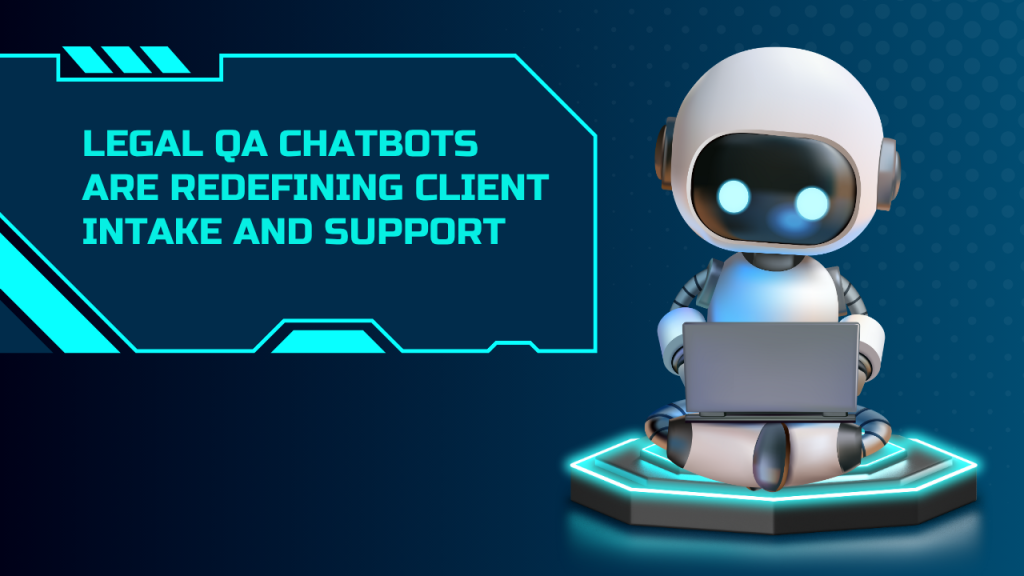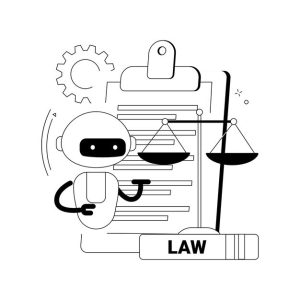Artificial Intelligence (AI) is no longer a futuristic vision to law firms it is the present that is reshaping the way legal services are to be provided. One of the most powerful innovations is Legal QA Chatbots that are becoming an efficient way to streamline client intake and improve client support. These AI-powered tools are transforming the industry as they automate routine processes and may give immediate solutions to legal problems and offer the help 24/7.
Technology has never been greater in law when 73 percent of law firms are utilizing cloud-based applications and 85 percent of litigators are submitting cases electronically (American Bar Association). AI chatbots have become a very essential component of this transition that brings about efficiency and better experiences to clients.
Why Do Law Firms Need Legal Chatbots?
A law firm is usually filled with numerous questions of the clients, scheduling, and paperwork. The following is how legal QA chatbots manage these demands:
1. Managing High Volumes of Client Inquiries
The Clients usually have simple legal inquiries, a case update, or documents related issues. Chatbots are better suited to deal with such standard interactions than to overwhelm lawyers or paralegals.To take an example, a personal injury law firm can implement chatbot answering all the frequently asked questions such as eligibility criteria, need of documents and time required-hours of manual work can be saved.
2. Automating Administrative Tasks
Such tasks as data entrance, document collection, and scheduling of appointments waste numerous hours. Chatbots facilitate these tasks and reduce errors on the part of the human factor, as well as opening a legal team to more complicated matters.
3. Providing 24/7 Accessibility
They do not require breaks like human staff does. Their services are available around the clock which is quite helpful when one of both the client and the lawyer is in a different time zone. The availability of 24/7 legal support increases reliability and accessibility.
How Legal Chatbots Improve Client Communication
Effective communication is key to client satisfaction. Here’s how AI chatbots enhance it:
Instant Responses to Common Questions
In the majority of situations, the clients merely want to know what a certain legal term implies, or what is going on in the case process, or how the case is progressing. Chatbots are effective, fast in delivering responses that increase confidence and reduce phone and email calls to clients.
Appointment Scheduling and Reminders
Customers can book a meeting via a chatbot and will get reminders and so reduce missed appointments and save time.
Real-Time Case Updates
Transparency is important to the clients. Chatbots are capable of delivering real-time updates about the status of the case, new hearings, and even provide secure access to the documents related to the case- totally eliminating the need of making follow up calls multiple times.
Streamlining Client Intake and Case Management
The client intake process can be tedious, involving lengthy forms and multiple follow-ups. AI chatbots make it seamless:
Automating Data Collection
Chatbots conveniently require the client information by interacting with them instead of manual input.
For example, an immigration law firm can implement chatbots on WhatsApp or its website to do initial screenings so they don’t overwork the paralegals.
Organizing Legal Documents
Chatbots have the ability to keep track of deadlines and organize the case files and make reminders of important dates.
For example, Corporate lawyers dealing with mergers can incorporate chatbots to deal with contracts and compliance documents that are within tight time limits.
Tracking Case Progress
By sending notifications and updates, chatbots maintain client engagement and help attorneys stay organized.
Real-World Applications of Legal QA Chatbots
- Initial Case Evaluations
Chatbots have the capability of conducting initial case evaluations, navigating clients through intake paperwork and determining viable cases within a short period.
- Legal Guidance and Education
They are able to offer simple interpretations about legal rights and procedures in order to have the clients get a clear comprehension of complicated laws
Use case: Chatbots are used to guide one through the process of applying to visas in immigration firms.
- Document Generation
Businesses can now get contract drafting or NDAs automated through chatbots and this can save their time and also make sure that accuracy remains at a high rate.
Best Practices for Implementing Legal Chatbots
To maximize benefits, firms must implement chatbots strategically:
- Ensure Data Privacy and Compliance
The information of the law is delicate. Follow the GDPR and the local regulations, use encryption and have transparent consent policies.
- Integrate with Existing Systems
Case management software should be integrated with chatbots so that they do not cause disruptions.
- Balance Automation with Human Oversight
AI is powerful but not perfect. Always have lawyers review critical outputs like legal advice or document drafts.
Challenges and Considerations
- Data Security Risks
Chatbots deal with sensitive information thus are exposed to cyber-attacks. It is important to conduct regular security updates and encryption.
- Avoiding Misinterpretation of Legal Advice
Answers provided by AI may be incorrect. According to a Stanford research, three out of four answers given by chatbots on judicial cases were wrong. Supervision of people and disclaimers are needed.
- Building Client Trust
People will not trust AI at first. There is the possibility of transparency in data management and clear expression of limitations of the chatbot.
The Future of Legal Chatbots
The next generation of legal chatbots will be even more sophisticated:
- Multilingual Support
AI will help firms serve clients from diverse linguistic backgrounds, breaking language barriers.
- Predictive Analytics
By analyzing historical data, AI will forecast case outcomes and risks, helping firms strategize better.
- Virtual Courtroom Assistance
Chatbots will assist in courtroom preparation—organizing evidence, managing schedules, and even simulating trial scenarios.
Conclusion
Chatbots Legal QA are not just the current high-tech fashion but rather a realistic answer to the idea of law firms being productive and providing the higher quality of services to the clients. Automating client intake, frequently asked questions, and document and deadline management, these tools cost less time and reduce expenses compared to the standard practice of attorneys and offer better client satisfaction.
With the evolution of AI technology, chatbots will be smarter, provide predictive advice, and support multiple languages. Such companies that use this technology will benefit tomorrow.
Ready to elevate your legal practice with AI? Start exploring legal chatbots now and transform your client experience.










